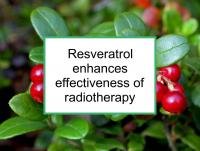Some micronutrients reported to reduce breast cancer risk have also been shown to enhance the sensitivity of breast cancer cells to radiotherapy. Among these are apigenin, curcumin, epigallocatechin gallate (EGCG), enterolactone, quercetin, melatonin, thymoquinone and vitamin D3.
These compounds typically sensitize breast cancer cells to radiation by inhibiting proliferation, inducing cell cycle arrest, and downregulating proteins involved in DNA repair. For reasons not well understood, most of these micronutrients are more effective in sensitizing hormone receptor positive (ER+/PR+) breast cancer cells than ER-/PR- cells to radiation. Now a new study has reported that resveratrol (best sources: blueberries, cranberries, red grapes) also enhances the cytotoxic effects of radiation in ER+/PR+ breast cancer cells.
We caution against taking the compounds listed above in supplement form because of the possibility of unintended consequences. Safe and effective dosages for these supplements during radiotherapy have not been established. It is also important not to take supplements or consume foods that reduce radiation's side effects by being radioprotective, thereby potentially protecting breast cancer cells from treatment.
Latest research finds resveratrol acts as radiosensitizer
The study referenced above was designed to investigate the potential radiosensitizing effects of resveratrol on ER+/PR+ MCF-7 breast cancer cells. Radioresistance and the side effects of radiotherapy both limit the effectiveness of this treatment. Therefore, identifying compounds that can enhance the cytotoxic effects of radiation in tumor cells while not harming normal cells is important.
To conduct the study, the authors exposed MCF-7 cells to 10 μM of resveratrol plus 3 Gγ ionizing radiation. This treatment had a highly cytotoxic and antiproliferative effect. After 24 hours, the cells showed clear signs of necrosis/senescence. Apoptosis (programmed cell death) was activated through reduction of the Bax/Bcl-2 ratio and increase in caspase 8 activity. In addition, the treatment affected the oxidative cell metabolism by increasing oxidative damage and reducing antioxidant enzymes activity. After 72 hours, it appeared that the antiproliferative effect was associated with a high p53 expression and interruption of cell cycle in the S phase. The authors conclude that resveratrol is a potential radiosensitizer of ER+/PR+ breast cancer cells.
